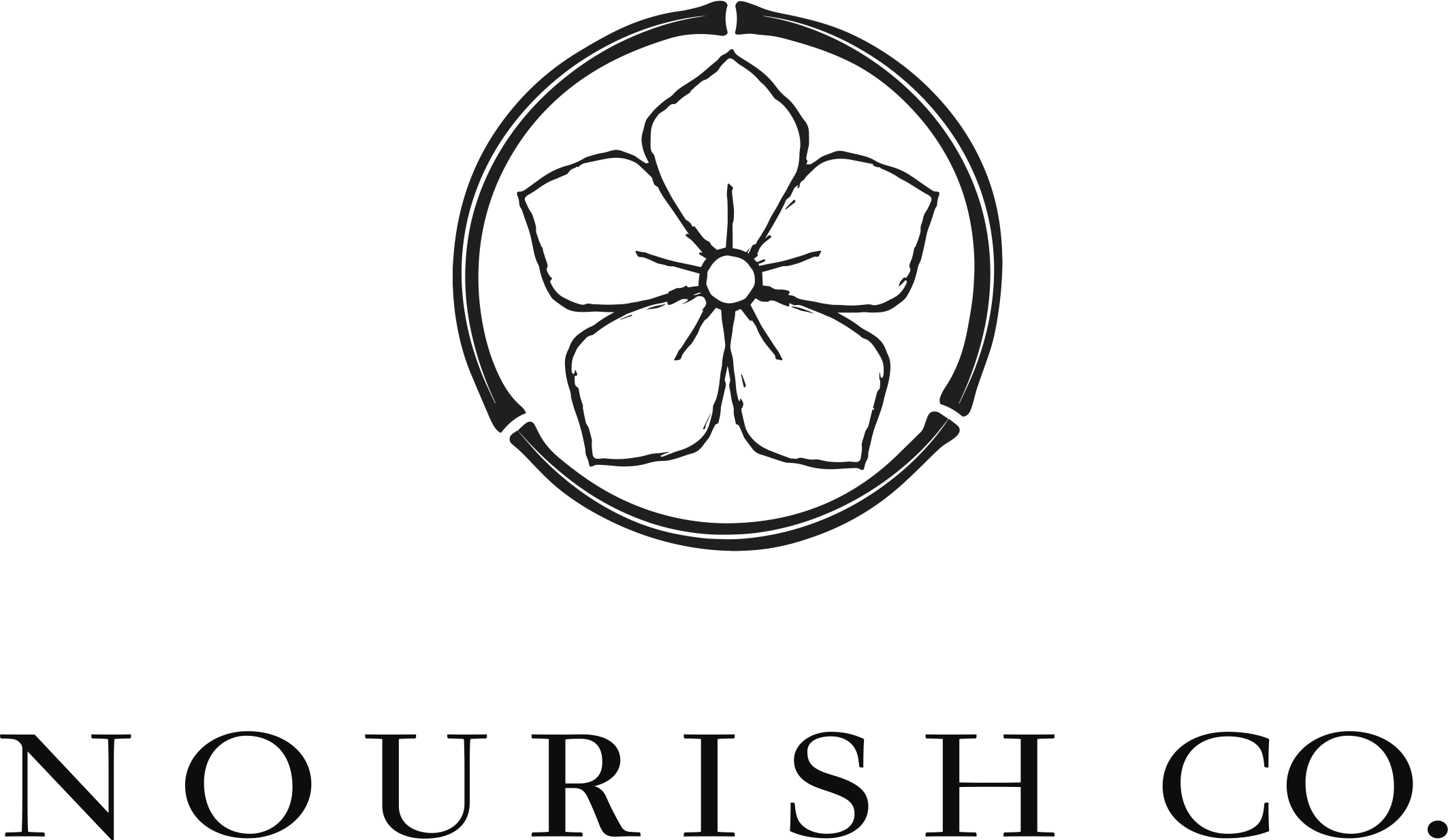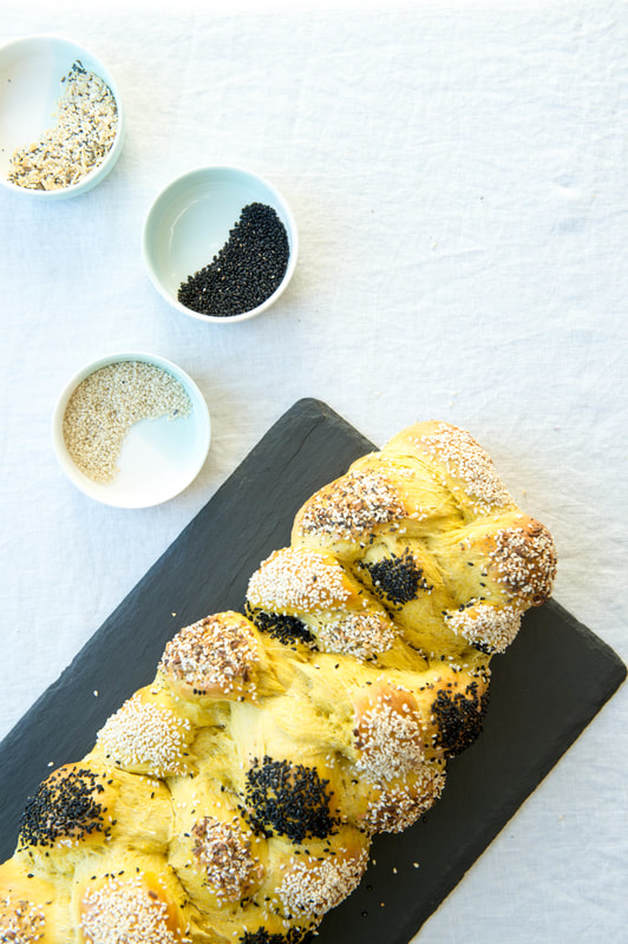Kabocha Pumpkin Challah
*Originally published on 18Doors
Besides the occasional pumpkin pie on Thanksgiving, I didn’t grow up eating a lot of pumpkin-flavored dishes. Instead, the women in my Japanese American family made stewed kabocha at this time of year. Whenever I see kabocha at the store, it takes me back to the delicious aroma of sweet kabocha stewed with soy sauce...
When I got to college and started cooking for myself, I tried my hand at the pumpkin soups, pies and baked goods I’d see in magazines at this time of year. Each time, I felt disappointed by the relatively mellow and mild flavor. Even the shade of orange was mellow and mild.
This year, I decided to make a kabocha challah for fall Shabbat dinners. The color is beautifully vibrant and the flavor has more depth and is more complex (savory and sweet at the same time!) than that of its sugar pumpkin cousin. You’ll have extra puréed kabocha and can use it to make this kabocha soup.
Makes: 2 large challahs
Total Cooking time: 5 hours
Active Cooking time: 1.5 hours
Tools Needed:
Kitchen Aid Mixer with whisk and dough hook attachments*
Large mixing bowl
Food processor or immersion blender
Candy thermometer
Plastic wrap
Pastry scraper
Cookie sheet
Parchment paper
Small bowl
Small whisk
Pastry brush
*can be made without Kitchen Aid mixer
Ingredients:
2 packages active dry yeast
1 cup lukewarm water
1/3 cup white cane sugar
1 egg, at room temperature
6 egg yolks, at room temperature
2/3 cup honey
2 tablespoons vegetable oil
2 teaspoons salt
2 teaspoons cinnamon
1 teaspoon nutmeg
2 cups kabocha squash puree
8 cups bread flour
Egg Wash:
2 egg yolks, at room temperature
1 tablespoon water
Toppings:
3 tablespoons everything bagel mix
3 tablespoons white sesame seeds
3 tablespoons black sesame seeds
Instructions:
Take 9 eggs out of the refrigerator.
To make the kabocha purée, boil a big pot of water with a generous dash of salt. While the water is boiling, cut and seed the kabocha, removing the bottom and stem (if it has one). Cut it into about 2” squares and cut the green skin away, discarding it. Place the kabocha squares into the pot of boiling water and turn the heat to low. Simmer for 20 minutes, checking with a fork to see if it’s finished cooking. It should be easily pierced through the middle without much resistance, but not fall apart. Purée in a food processor or with immersion blender. Reserve 2 cups for the challah.
In the bowl of a stand mixer, pour 1/2 cup of the lukewarm water into a large mixing bowl.
Using a candy thermometer, check to make sure it is about 110°F. Pour in the two packets of
dry yeast and 1 tablespoon of sugar (from the 1/3 cup) into the bowl. Stir gently to dissolve
everything into the water. Set the bowl aside for 15 minutes.
Your yeast mixture should look foamy at the end of the 15 minutes. If it does not, you need to get new yeast and start over or your challah will not rise. Better to find out now, rather than later!
Now that your yeast is activated, add the remaining lukewarm water to the bowl, then the
remainder of the sugar, egg, 6 egg yolks, honey, oil, salt and spices. Whisk on medium speed.
Once everything is evenly incorporated, add your kabocha puree and keep whisking.
Once the mixture is smooth, thick, and bright orange, change out your whisk for a dough hook.
Add each cup of flour slowly on low speed. With a rubber spatula, scrape the bottom and sides
down with each addition. When you’re on the 7th or 8th cup, the dough will become too
thick for your mixer. At this point, you can start to knead with your hands. When you’re done,
the dough should be smooth and stretchy but not super sticky. If you need to, add a bit more
flour until you reach this consistency.
Oil the entire inside of a large mixing bowl with vegetable oil. Place dough in this bowl and cover it with plastic wrap. I like to put my dough in my oven (but not turn it on).
After 1 hour, punch the dough back down to remove the air and let it rise again for another
hour.
After another hour, punch the dough down again and knead it into a smooth ball on a floured
countertop. Cut the ball in half with a pastry scraper.
Line two large baking sheets with parchment paper. Beat the egg yolks and water in a small
bowl with a small whisk.
Now it’s time for braiding! There are many different ways to braid challah, and I prefer the look of the 4-strand braid because it’s simple but still looks impressive! I like to use Tori Avey’s 4-Strand Braided Challah tutorial.
Preheat your oven to 375°F. Using a pastry brush, generously apply egg wash to each of your challahs. Generously sprinkle them with everything bagel mix, black and white sesame seeds in sections (see photo). Alternatively, you can also just season it generously with everything bagel mix and let them rise for 30 more minutes.
Bake challah for 40 minutes, but set your timer for 30 minutes. At this point, check on your
challah to see if it needs to be rotated. If it’s browning quite quickly, you may need to cover it
with foil for the remainder of the cooking time. Shabbat Shalom!
Head here to visit our Modern Heirlooms web shop, where I've thoughtfully co-created ritual objects with my favorite artisans (in limited runs) to help you elevate your sacred rituals.
I truly believe that cuisine is the most accessible gateway into learning more about our rich heritages. In addition to food, there are so many ways to celebrate, honor, and even reclaim, our time-honored traditions. I believe ritual objects really help anchor us in these moments-- especially around the table.





